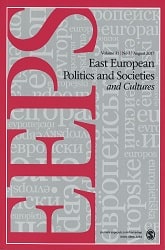Wherefore the Liberal State? Post-Soviet Democratic Blues and Lessons from Fiscal Sociology
Wherefore the Liberal State? Post-Soviet Democratic Blues and Lessons from Fiscal Sociology
Author(s): Jørgen MøllerSubject(s): Political history, Government/Political systems, Transformation Period (1990 - 2010), Post-Communist Transformation, Fiscal Politics / Budgeting, Sociology of Politics
Published by: SAGE Publications Ltd
Keywords: post-communist transitions; liberal constitutionalism; fiscal sociology;
Summary/Abstract: The post-Soviet setting is characterized by a disheartening political paradox. Since the fall of communism, some kind of electoralism has been spreading to almost every corner of the former empire, yet liberal rights and the rule of law have not been its fellow travelers; nor do they seem destined to provide companionship in the imminent future. Revisiting the long-standing German current of fiscal sociology, it is possible to solve this paradox. In the Europe of yesterday, liberal constitutionalism was the product of a quid pro quo between the rulers and the ruled: an exchange of rights for revenue. Historically, this “grand bargain of the liberal state” was a prerequisite for liberal democracy, and the very same social mechanisms—or lack thereof—seem to be operating in the post-Soviet world of today.
Journal: East European Politics and Societies
- Issue Year: 21/2007
- Issue No: 02
- Page Range: 294-315
- Page Count: 22
- Language: English
- Content File-PDF

